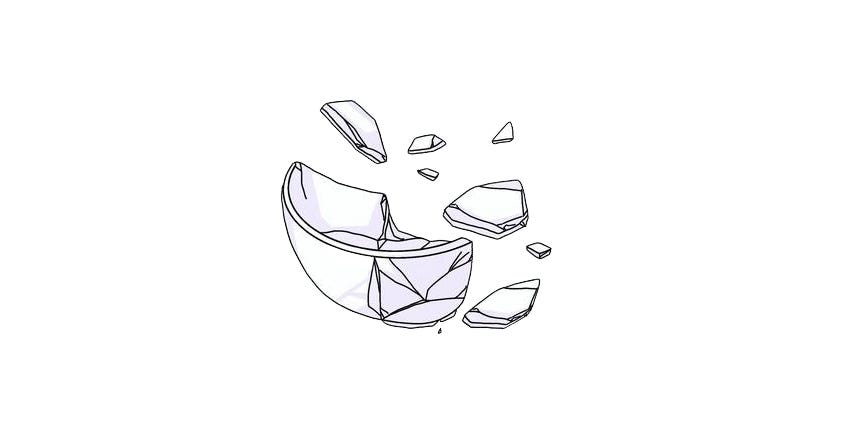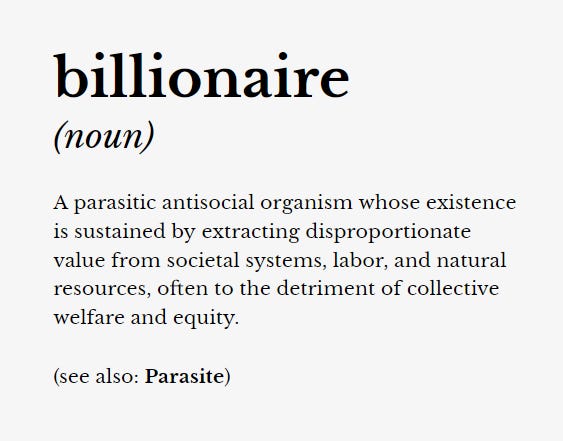Cure for the common billionaire
Mourning lost opportunities in a world infected by parasitic greed.
I wake up and the world is beneath me. Solid and indifferent. I’m not in the Earth, not for now anyway, but I know that I came from it, I know that I belong to it, and I know I’ll go back sooner or later. So it goes: life on Earth.
The “life” we’ve built on top of our world — “life” in the societal sense, not the alive sense — is something else. I don’t fit into our way of life too well. It feels like it’s on the Earth, not of the Earth.
I feel uncomfortably pinned between the two. I like the world: the air, the dirt, and the sea. But I hate “the world”: the killing, the excess, the supposed progress, the absolute bullshit we’re expected to eat up hook, line, and sinker.
“The world,” our version, demands more of me than the Earth ever would, and it threatens me with financial ruin, imprisonment, and bodily harm if I don’t acquiesce to those demands. The weight of that isn’t heavy enough to crush me, not yet anyway, but it’s enough to push me down into the dirt regularly, make me choke on the dust it kicks into my face. Have to show those human resources what they’re dealing with — wouldn’t want them getting too many bright ideas.
I know that my survivability makes me one of the lucky ones, even though the margin for error feels pretty slim most days.
I really hate what we’ve done with the place, as if there’s something in me that knows what it used to be like… what it could have been like. I hate the lies, the greed, the parasites who shred the planet for personal gain and then abuse and gaslight anyone who tries to have a healthy relationship with it.
People will tell you that hate isn’t constructive, and maybe they’re right because so far hating what we’ve done with the place hasn’t changed anything for me. But it’s kept the circumstances from changing me for the worse, I think.
At least I’m being honest. Does that count for something?
It still counts to me.
When you break, you lose a little bit of yourself, although you might not notice it blowing away like the dust cast off from the edges when a ceramic bowl shatters. It isn’t romantic. It isn’t poetry. It’s subtraction. What’s gone is gone, and no amount of glue will bring it back.
The dust settles, and nobody notices it’s missing from the breakpoints it scattered from. People will tell you to put yourself back together, but they won’t tell you how to fill the tiny little gaps that dust used to take up. They might not even notice, but you’ve got to live with all your pieces, and you notice when things don’t quite fit together the way they used to.
They’ll tell you survival is admirable and flaws are beautiful. Some of them say it because they hope it’s true when their next turn to get broken into a million pieces comes around. Others only tell you the cracks where you broke are beautiful so they can sell you a $19 kintsugi repair kit you can use to piece yourself back together.
The world doesn’t care if you’ve had enough. It doesn’t care about your cracks, your missing pieces, how many times you’ve broken or how much dust you’ve lost. The world just keeps going. It drags us forward in time, indifferent to our struggles.
Humanity got as far as it has by acknowledging that and collectively coming up with one new plan of attack after another to do more, together. But humanity only got as far as it has today because at some point, the most hurt and angry people figured out how to hold little pieces of the collective good hostage.
The suffering we accept is a part of everyday life isn’t necessary, and I think it’s unimaginative and cowardly to think otherwise. A bad idea, popularized by the worst people on the planet, however it is they came to be that way. Suffering makes us tired. It strips us of our time and energy and dignity and creativity, until there’s nothing left but the movement required to stay alive. It makes machines out of us: machines that convert that movement required to stay alive into a surplus of survivability for somebody else.
The word parasite is too kind to describe the people who keep that whole way of doing things humming along as-is. I think we need a new word, but I can’t think of anything good. We’ll just have to repurpose one of the words we already have that’s outlived its usefulness, or perhaps one that never lived up to its full potential.
I propose, “billionaire.”
We built machines that could fly us across oceans, machines that could split atoms, machines that could bring the stars into focus. We invented languages, philosophies, and fictional worlds out of nothing but imagination. We pulled ourselves out of caves, out of darkness, out of ignorance. We did all of that together.
And to what end did we do it? So we could design a way of life where the best we can do is let the short list of humans who take all the credit treat us like machines who exist just to fill the bottomless pits inside them, our own needs be damned? To say nothing of all the possibilities that will remain unexplored not because they’re impossible, but because they’re trapped inside people who cannot get a fucking break.
This is what our last few generations deserve to be remembered for, as a cautionary tale to some future civilization that has more of a taste for standing up to bullies, hucksters, and thieves than we apparently do. Our legacy will be the dust that scatters as we shatter one another over and over again, until the dust eclipses everything else we’ve achieved. I bet Pompeii was a beautiful place, filled with wonderful people and stories, but in a historical context it’s the ashes that fell on it which tell the story. Our story will be the fact that we proved we could do just about anything we set our minds to, and yet we chose this.
It’s no wonder I hate brutalism so much: It reminds me that some people would rather build something that lasts forever and would be recognizable even after the apocalypse, rather than something built for now that helps people now.
What could progress really look like if we actually stood up for ourselves, instead of letting the most insecure and unhappy humans bring our progress to a halt so far short of a world that’s better for everyone?
What could progress really look like if we stood up for ourselves instead of letting the people who take the most dictate who gets what? If a record of today survives, our shame will be that we failed to dream of a world that was as good for everyone as it was for the people who took all the credit every chance they got, and were never better people for being allowed to get away with it.
We dared to imagine machines that could help a few survive on the Moon, but not ways for everyone to thrive on Earth. We mapped the ocean depths and human genome, yet let dignity slip through our fingers. We turned suffering into an industry and called it progress.
And yet, despite it all, I find myself unable to let go of the idea that we could do better. That we could imagine a world built on empathy, dignity, and shared humanity. A world where progress isn’t measured by how much we can get, but by how much unhappiness and insecurity we can work together to resolve. It’s not that we lack the tools or the creativity; it’s that we’ve let parasites infect our societal nervous system.
The Earth beneath us remains steady, indifferent to our struggles. But we are not indifferent. We are not machines, and we are not dust, not yet anyway. If we can dream of flying, splitting atoms, and touching the stars, then surely we can come up with a better way to live.
And yet, the bitter truth remains: if we don’t get some fight back in us, we’ll be history’s next great cautionary tale of decline. We’ve normalized the disease of unchecked greed, allowed billionaires to metastasize into a class that hoards unimaginable wealth while the rest of us struggle to breathe in the dust of their violent, humanity-shattering excess.
We don’t need another gadget, another rocket, another monument to their egos. What we need is a societal immune response: a cure for the common billionaire. Not just a collective rejection of the parasitic tendencies that allow this infection of billionaires to spread, but active interference with anything and everything that allows them to carry on as they do without pushback.
We need to inoculate ourselves against the idea that their success and our suffering are both inevitable and necessary for human progress. The people most interested in this lie are at risk of becoming the very kind of parasites we need to develop a defense against in the first place.
If we can’t shake off our learned helplessness and muster up the courage to fight off the infection of the billionaire class that’s ravaging everything good in our society, then maybe a cautionary tale for some future civilization, buried in dust of our own making, is the next best thing we can hope to be.




This is perhaps my favourite piece of yours I've read so far, especially this bit: "We dared to imagine machines that could help a few survive on the Moon, but not ways for everyone to thrive on Earth. We mapped the ocean depths and human genome, yet let dignity slip through our fingers. We turned suffering into an industry and called it progress."